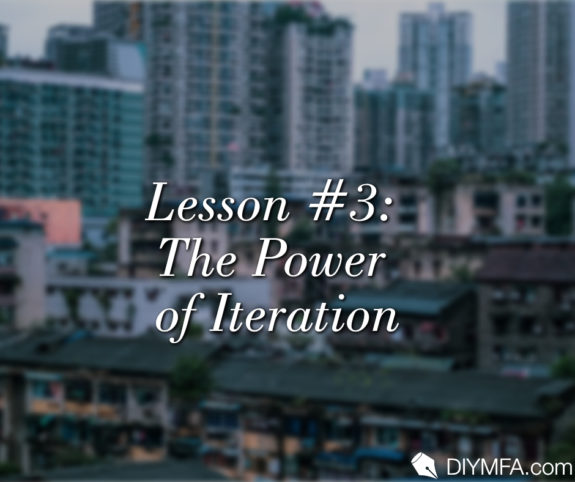The past few weeks have been heavy ones, leading to a lot of introspection both in my personal life and also in my writing and business. If you’d like to see where DIY MFA stands in light of recent events, I shared some thoughts on our website.
While I realize that there is no returning to “business as usual,” I also recognize that recent events—from COVID-19 to our nationwide struggle against racism—have taken an emotional toll on many of us. As word nerds, writing is our sanctuary and our creative outlet. And while I recognize that our world is still far from normal, I wanted to resume that newsletter essay series that we started before COVID happened. This series is “Ten Lessons in Ten Years.”
Lesson #3: The Power of Iteration
Today’s focus is iteration, a deliberate process of trial and error in which you try something, observe the results, then make adjustments accordingly. I first discovered this important concept when reading Eric Reis’s book The Lean Startup, and I realized that there are many parallels there are between how tech startups approach innovation and how we writers can approach our writing.
Just as software developers release a minimum viable product and use feedback from beta-users to make improvements, so too can we test different aspects of our writing process. From time of day to the location where we work or the writing implements we use, we can use iteration to become more efficient and effective as writers.
Iteration has since become one of the core tenets of DIY MFA and most recently my thoughts on the subject have been far more meta. In fact, I have been iterating the very concept of iteration. But I am getting ahead of myself. Before we can look at how to iterate the concept of iteration, we must consider the epic philosophical parallels between Yoda and Samuel Beckett.
Yoda vs. Beckett
Yoda and Beckett have a lot in common. They are both exceedingly quotable (as you’ll see below) and while they are known predominantly in relation to a single work, the ripple effect of their presence extends far beyond it. But perhaps the most significant parallels are the thematic ones, the similarities in what Yoda and Beckett stand for.
As a trainer of Jedi, Yoda challenges his students to question their assumptions. He pushes them to examine (and possibly abandon) their most closely-held beliefs and ideals in order to serve the greater good according to the Force.
Similarly, Beckett challenges the very essence of what a stage play even is. Consider the trajectory of Beckett’s plays—from Waiting for Godot, to Happy Days, and then his later and lesser-known works: Play, Not I and Rockaby. With each iteration, Beckett reimagines the actor’s role and agency in a stage play. He does this first by limiting the characters’ movement, by confining them to fixed spots on stage. In later plays he also limits the characters’ visibility, through use of lighting and limited field of view. Finally, in the case of Rockaby, he removes the actor’s voice almost entirely from the performance by having most of the lines delivered via a tape-recording.
Despite these parallels between Yoda and Beckett, they do appear to have one big contrast between them. They have very different outlooks on how to handle failure. At least, their perspectives seem opposite on the surface. Let’s take a closer look by analyzing each of their most famous and meme-worthy quotes.
“Do. Or do not. There is no try.”
~Yoda
According to Yoda, there is no room for half-baked effort in the life of a Jedi. Either you do something, or you don’t. There is no in-between. Being one with the force requires full commitment; you have to be all-in. What Yoda doesn’t address is what you do when you commit to something but it goes horribly wrong. The implication here is that the result (i.e. doing or not doing something) is not dependent on effort, but on the strength of the commitment. If you end up in the “do not” camp, it’s not because you didn’t try hard enough, it’s because you did not fully commit to doing the work.
“Ever tried. Ever failed. No matter.
Try again. Fail again. Fail better.”
~Samuel Beckett
At first glance, it looks like Samuel Beckett takes a different stance. He assumes that failure is a natural part of life. You try. You fail. You keep going. But that word “ever” adds a layer of nuance. Beckett doesn’t say “I tried. I failed.” He says “Ever tried. Ever failed.” Trying and failing are not a one-and-done cycle, they are part of the continuous ebb and flow of our entire lives. Yes, you try and you fail, but the key is to come back again and again. Failing better means you make a commitment to keep trying.
The idea of commitment is what links Yoda and Beckett’s philosophies. Yoda tells us there is no wishy-washy middle ground; we either commit to taking action, or we don’t. Beckett tells us that failure is a given; we must go into every activity with the expectation that it will fail and we will need to try again. When we “fail better,” we commit to being resilient and bouncing back, no matter how many failures happen along the way.
Taken together, Yoda and Beckett’s philosophies capture the iterative experience of writing. First, we commit. We write or we don’t; there is no in-between. Yet even as we dive headlong into our creative work, we must simultaneously accept that our efforts will fail and that this failure is a victory, because it opens the door to better work. Iteration challenges us to pour our hearts into our writing and make it the best it can be, but we must simultaneously accept that our work will never be perfect. We will always have room for improvement.
Iterating Our Own Humanity
This tug of war between commitment to the work but also accepting imperfection is especially significant in light of recent events. Lately I have been reflecting on my role as the leader of DIY MFA, and how I will choose to step up and serve this word nerd community during this time of reckoning. If you’d like a window into this thought process, you can check out this post and this post.
The more I ponder and sit with the discomfort of not having all the answers, the more I realize how Yoda and Beckett’s philosophies apply to this moment. Iteration is a tool for growth, and the most rewarding and productive way to use this tool is when we iterate our own humanity. Think of it as iteration for the soul.
There is no room for half-baked effort, especially not in these tough times. We can’t sit idly in that comfortable space of “try.” Either we take action, or we do not, and either way, we must accept the consequences of our choice. At the same time, we must also understand that we don’t know all the answers. We must be willing to fail and try again. We must keep ever trying because only in doing so can we hope to grow, to improve, to fail a little better the next time.
This is the power of iteration. It’s not just some techy tactic designed to produce and launch a a digital widget. Iteration is a way of existing in the world. It is an exercise in humility because it means we must accept (but not settle for) our own limitations. It is also an act of faith, because even when we fail, we must believe we have the resilience to bounce back and the fortitude to do better the next time. Iteration is that glimmer of light at the end of a long tunnel, reminding us that a better world is possible and leading us out of the darkness.

Gabriela Pereira is an author, speaker, and entrepreneur who wants to challenge the status quo of higher education. As the founder and instigator of DIYMFA.com, her mission is to empower writers, artists and other creatives to take an entrepreneurial approach to their education and professional growth.
Gabriela earned her MFA in writing from The New School and speaks at college campuses and national conferences. She is also the host of DIY MFA Radio, a popular podcast where she interviews bestselling authors and book industry professionals and author of the book DIY MFA: Write with Focus, Read with Purpose, Build Your Community.







